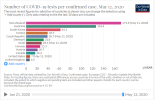Apologies, I didn’t intend my latter comments (everything below bullets) to be directed at you specifically. No animosity intended. I should have put “BT” and make a clean break.As to your repeated hairdresser example, it sounds like a one off. How many other times has this happened? Or are you just focusing on one example that's an outlier and using that to derive your conclusion? Think about it.
- They work for elected officials and are executing elected officials' intent. The Mayor (or whatever) doesn't have to do everything and can use his staff and supporting agencies to execute the vision. If what's happening isn't in line with what the locals want from their local government then they are free to boot them out next election and reshape the agencies. If what is happening there is supported by the locals and not by you (assuming you're not local) then it doesn't matter (unless you're a Tesla stockholder) because you don't get a say.
- I doubt most constitutions have pandemic rules. But they have leeway for officials to execute policy as needed in light of available data. US Govt, State, and lots of local govts said "stay home." I'd imagine if challenged in court the courts would rule in favor of the officials as acting within their constitutional purview. You're welcome to your opinion on it, but as to whether or not it's ACTUALLY overreach or illegal then that will be up to the courts.
- There's not a lot of precedent for a pandemic. Everyone is making it up as they go along.
BT
To anyone:
Even if federal/state/local executives want to give an order, it has to still be in line with constitutionality, or it’s invalid, right? Freedom of speech, religion, and assembly protections are very strong. Or so I thought.
If a local bar established a “Lake County Beer Drinkers Political Caucus” and then sold beer and handed out political stickers to everyone who showed up (and customers wore masks when not drinking and kept a social distance), with the stated political agenda of advocating freedom for beer drinkers, I’d wonder if it could be shut down without violating 1st Admt rights.
As for hairdressers, help me out here. What I mean to describe are workers who cannot work remotely, and are largely not considered “essential personnel” or critical industries in executive orders, but they could perform their jobs singly, and with their own tools, without re-opening a physical facility or working as part of a large team.



